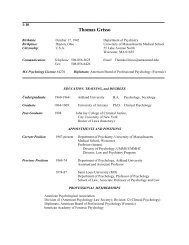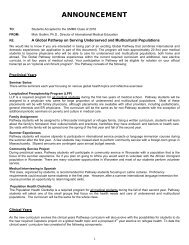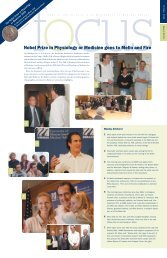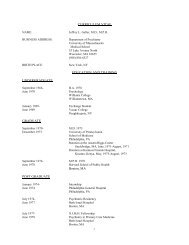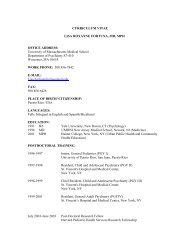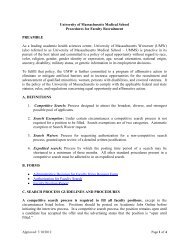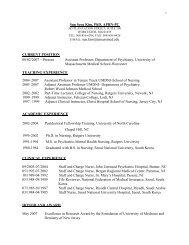Anger Management Manual - the ATTC Network
Anger Management Manual - the ATTC Network
Anger Management Manual - the ATTC Network
Create successful ePaper yourself
Turn your PDF publications into a flip-book with our unique Google optimized e-Paper software.
A Cognitive Behavioral Therapy <strong>Manual</strong><br />
give me approval.” If you hold such a belief, you are likely to get upset and angry when you<br />
face rejection. However, if you dispute this irrational belief by saying, “I can’t please everyone;<br />
some people are not going to approve of everything I do,” you will most likely start to calm<br />
down and be able to control your anger more easily.<br />
Ano<strong>the</strong>r common irrational belief is, “I must be respected and treated fairly by everyone.” This<br />
also is likely to lead to frustration and anger. Most folks, for example, live in an urban society<br />
where <strong>the</strong>y may, at times, not be given <strong>the</strong> common courtesy <strong>the</strong>y expect. This is unfortunate,<br />
but from an anger management perspective, it is better to accept <strong>the</strong> unfairness and lack of<br />
interpersonal connectedness that can result from living in an urban society. Thus, to dispute<br />
this belief, it is helpful to tell yourself, “I can’t be expected to be treated fairly by everyone.”<br />
O<strong>the</strong>r beliefs that may lead to anger include “Everyone should follow <strong>the</strong> rules,” or “Life should<br />
be fair,” or “Good should prevail over evil,” or “People should always do <strong>the</strong> right thing.” These<br />
are beliefs that are not always followed by everyone in society, and, usually, <strong>the</strong>re is little you<br />
can do to change that. How might you dispute <strong>the</strong>se beliefs? In o<strong>the</strong>r words, what thoughts<br />
that are more rational and adaptive and will not lead to anger can be substituted for such<br />
beliefs?<br />
For people with anger control problems, <strong>the</strong>se irrational beliefs can lead to <strong>the</strong> explosion phase<br />
(10 on <strong>the</strong> anger meter) and to <strong>the</strong> negative consequences of <strong>the</strong> postexplosion phase. It is<br />
often better to change your outlook by disputing your beliefs and creating an internal dialog or<br />
self-talk that is more rational and adaptive.<br />
Exhibit 6. The A-B-C-D Model<br />
A-B-C-D Model*<br />
A = Activating Situation or Event<br />
B = Belief System<br />
What you tell yourself about <strong>the</strong> event (your self-talk)<br />
Your beliefs and expectations of o<strong>the</strong>rs<br />
C = Consequence<br />
How you feel about <strong>the</strong> event based on your self-talk<br />
D = Dispute<br />
Examine your beliefs and expectations<br />
Are <strong>the</strong>y unrealistic or irrational?<br />
*Based on <strong>the</strong> work of Albert Ellis, 1979, and Albert Ellis and R.A. Harper, 1975.<br />
35




